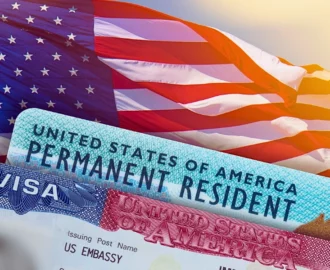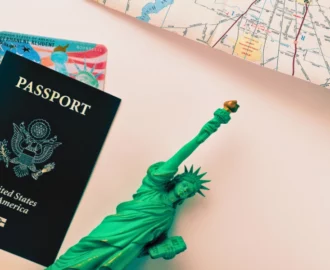If you get fired on a work visa, you will have a 60-day window to gain employment elsewhere, prepare to return to your country of origin or try to obtain another type of visa when possible.

While you might enter the U.S. on an H-1B work visa to gain lawful employment, certain circumstances could lead you to unexpectedly lose your job. The visa doesn’t guarantee job security. If you are suddenly unemployed and aren’t sure what to do next, you still have some options available to you.
Will You Be Deported if You Are Fired on a Work Visa?
Of the four types of immigration statuses, people in the country on H-1B visas do not have legal residency or citizenship. They must be in the U.S. to perform specialized work of some kind. Otherwise, their H-1B visa becomes invalid. If an H-1B visa holder gets fired on a work visa, the individual could face deportation if it’s impossible to find work with another employer in a certain amount of time.
The Grace Period for H-1B Visa Holders
According to U.S. Citizenship and Immigration Services (USCIS), H-1B visa holders have the ability to stay within the country for another 60 days after losing their jobs. After that grace period expires, they face deportation. If your I-94 expires before the grace period ends, you will have until the expiration date to do what you can before facing deportation. Either grace period gives you time to take action before deportation takes place.
During this time, you can do one of the following:
- Find another job
- Apply for a change of status
- Voluntarily return to your home country
The grace period will begin on the day of termination or resignation. This means that once you’ve received an official notice of termination, the 60-day window will begin.
Rights for Workers on an H-1B Visa
Some H-1B workers may wonder what kinds of rights they have to their position with an employer. The fact is that the government labels non-immigrant work as “at will.” In these cases, if an employer has a legally valid reason to let an H-1B employee go, he or she has the authority to do so.
At the same time, you will have the right to the same treatment as other terminated employees, including access to certain benefits such as severance pay.
However, it’s important to note that if you lose your job and want to continue working in any capacity during your grace period, you won’t be able to start part-time work or any other unauthorized work.
How Can You Extend Your Visa?
If you want to stay in the U.S. and continue to work, you will either need to gain employment at another job after getting fired on a work visa, or apply for a change of status.
If you cannot get a new job after getting fired on a work visa, your best option would be to apply to change your status. A few different options are available to you if you choose this option, including applying for an H-4, B-2, or F-1 visa.
Popular Industries for H-1B Visa Applicants
If you decide to seek employment with another employer, some industries are more likely than others to sponsor you as an H-1B visa holder. Some examples of top industries for H1B visa applicants include the following:
- Computer systems design and similar services
- Scientific, management, and technical consulting services
- Educational services
- Engineering and architectural services
- The tech industry
- Insurance and finance
Many leading brands across various industries also hire many non-immigrant workers on H-1B visas. Some top employers hiring at this time include Amazon, Google, IBM Corporation, Apple, and Goldman Sachs, among others.
When Can I Begin Work if I Find a New Job?
You may manage to find work before the grace period ends. If this is the case, you can begin working for your employer once you receive a Receipt Number from USCIS. You won’t need to wait for the full 60 days to pass. For example, you may get a new job and receive your receipt 45 days into the grace period, at which point you can begin work immediately.
Changing Status to Avoid Deportation
If you are unable to find work or simply wish to change your status instead, there are a few different ways to apply for a change of status.
H-4 Status
If you have a spouse with an H-1B visa who’s still employed in the U.S., you may be able to change your status to an H-4 visa holder. This would make you a dependent in connection with your spouse. While you have H-4 status, you can continue looking for work without the looming grace period putting pressure on you to do so.
Like other status changes, you should apply as soon as possible once the grace period starts to increase your chances of getting approved on time.
You may wonder whether you can gain employment and work with H-4 status during the grace period. While the government makes it clear that non-immigrants are unable to work during the grace period, you may still be able to gain employment if you have a valid H-4 visa at this time. Before making any decision on the matter, it’s important to speak with an attorney for clarification about your options.
F-1 Status
In some cases, you may be able to apply for an F-1 student visa if you apply to a higher education institution, including a college or university. This will enable you to pursue an advanced degree or another degree before resuming looking for work.
B-2 Status
Another option is to change to B-2 tourist status, but this is normally difficult to obtain in this instance. The government doesn’t consider searching for a new job a form of tourism activity. Therefore, USCIS may not grant a visa unless you also have plans to travel.
Another potential issue with this status is that even if you gain employment in the U.S. on this visa, you may need to visit your country of origin before obtaining another H-1B visa. Because of these inconveniences, it’s often best to apply for an H-4 or F-1 visa.
What to Do to Qualify for a Status Change
To stay within the country without applying for a new job after getting fired on a work visa, you will need to meet certain qualifications to change your status, whether seeking an H-4 or another status change. The following are different ways you can successfully stay in the country while temporarily out of work:
Marry a U.S. Citizen
While you should never get married to a U.S. citizen purely for visa purposes. However, you may have begun a relationship with someone in a citizen in the U.S. If you and your partner are prepared to get married, this is a good step to take to initiate the process of obtaining an H-4 or another type of visa as a spouse. Keep in mind that you will need to prove the validity of your relationship when applying for any type of family-based visa.
Become a Legitimate Tourist
You may have a hard time getting a B-2 visa if you intend to find work, which isn’t a tourist activity as USCIS defines one. However, you may be able to qualify for this visa if you plan on taking a vacation in the U.S. Whether you decide to travel to another location in the country or simply enjoy a vacation where you are, this would fall under the umbrella of tourism. In turn, you may be able to apply for a B-2 visa. However, USCIS may not allow you to be in the country with this visa if you intend to spend vacation time seeking employment.
Make a Large Investment
You may also be able to stay in the U.S. if you make a substantial investment in something like a business or new product. Large investments are typically those that go up to hundreds of thousands of dollars. You may be able to qualify for a visa even if you invest $100,000 or less, depending on the type of investment.
Voluntarily Leaving the Country
In the event you are unable to find work during the grace period or apply for another visa status, you have the option of leaving the country at your own volition before facing deportation.
If you decide to leave the country, you can have your former employer cover the cost of returning, as long as you didn’t voluntarily quit your job. Employers must always offer to cover the travel costs for H-1B employees after firing them, whether the worker is going back to his or her home country or the previous country of residence.
Can I Leave the Country Temporarily During the Grace Period?
You are authorized to travel outside the U.S. during your grace period. However, you cannot return during the grace period, as you no longer have a valid H-1B visa. Instead, you would need to take steps to get another type of visa that allows you to re-enter the country. While out of the country during your grace period, you can still continue to look for work or undergo the visa application process before re-entering.
Is It Possible to Use the Grace Period for Another Time?
You might be able to get work or change status before the grace period ends. If this is the case, you might be curious to know whether it’s possible to use any unused days from those grace periods for future purposes. At this time, it’s impossible to carry a grace period forward. It will only apply to the current situation.
Should I Work with an Immigration Consultant?
If you get fired on a work visa, and want to find out what options are available to you afterward, you may consider turning to an immigration agency. However, there are potential issues that can come with hiring an immigration consultant over an immigration lawyer.
One of the main setbacks of working with an immigration consultant is that they don’t require any background or experience in immigration law. They may help provide certain services such as submitting your forms to USCIS and helping with completing these forms. However, they won’t be able to provide legal representation or legal advice.
Another problem that you may experience when hiring an immigration consultant is fraud. Fraudulent agencies do exist, and they may attempt to take advantage of you by making promises or providing certain services that they cannot provide. For example, an agency may offer to provide representation at USCIS hearings, give legal advice for undergoing the immigration process, and assist with the naturalization process. These are all services that immigration consultants are unable to provide. Additionally, consultants may claim that they have direct connections to certain USCIS officials or other powerful individuals when this simply isn’t true and won’t help your case.
These potential problems make it important to do your research when seeking an immigration consultant. Instead, you may want to consult with an attorney to discuss your case.
How Can a Business Immigration Lawyer Help if You Get Fired on a Work Visa?
A business immigration lawyer has experience in immigration law, particularly issues pertaining to business immigration. An experienced and knowledgeable attorney will be able to provide legal services and guidance if you lose your job on a work visa. They can protect your rights and make sure you understand what you can do, whether it’s best to continue looking for work, seeking higher education and changing your degree, or taking another step. They’ll also be able to provide representation in hearings, unlike immigration consultants.
Upon getting fired on a work visa as an H-1B visa holder, you may still be able to gain employment, change your status, or voluntarily return home. Taking the right steps if you get fired on a work visa can help you avoid deportation once the grace period ends.




